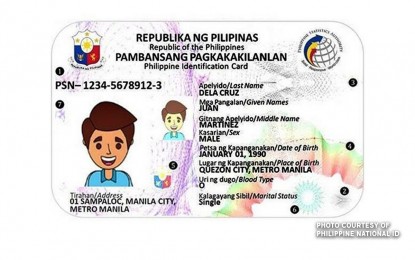
DAVAO CITY – The national ID is a vital component in the implementation of the Universal Health Care (UHC) Act, an official of the Department of Health (DOH) said.
Speaking before the One Davao on Covid-19 virtual presser recently, DOH-11 assistant regional director, Dr. Lenny Joy Rivera, cited the importance of the national ID in registering every Filipino to primary health care or the Philippine Health Insurance Corporation (PhilHealth) so they can access various health services provided under the UHC.
The UHC provides automatic enrollment of all Filipinos to PhilHealth and designates the state-run agency as the national purchaser for health goods and services.
UHC also seeks to improve health facilities especially in underserved communities, respond to the gap in health workers throughout the country, and create and expands new functions in DOH to improve the delivery of health services.
“Despite the Covid-19 pandemic, Filipinos are entitled to other health services. That is the primary aim of DOH and Covid-19 should not hinder this commitment. The national ID is very important so that all Filipinos could easily avail of the health care services,” Rivera said.
She said when an individual presents his national ID to DOH to access health services, the person could easily avail of the services.
Most of those who are confronted with health problems come from poor communities, making them far from access to much-needed health care.
Covering gov’t, private transactions
According to Philippine Statistics Authority (PSA) Region 11 officer-in-charge Pepito Amoyen, said when people seek to avail of health services, hospitals will be looking for their national ID. This will be the same with other government agencies.
“If you ask something from government, they would request for your national ID same also if you transact with the banks like opening a bank account, the bank will also look for your national ID. That’s how important a national ID is,” Amoyen said.
The pre-registration of PhilSys or the Philippine Identification System nationwide started on Oct. 12.
On Nov. 25, those who were pre-registered will be invited by PSA to the various PhilSys Registration Centers for the registration proper.
After getting the registrant’s biometrics in the registration proper, all the encoded information of each registrant will be revalidated.
If all the entries are successfully authenticated, the system will generate the registrant’s PhilSys Number or PSN.
After that, a Philippine ID will be printed and will be issued to the registrant for his or her personal use.
Registration for the general public will continue until 2022.
The PhilSys registration centers include, among others, regional and provincial offices of PSA, local civil registrar’s office, Government Service Insurance System, and Social Security System.
Signed into law by President Rodrigo R. Duterte in August 2018, Republic Act 11055, or the Philippine Identification System Act, aims to establish a single national ID for all Filipinos and resident aliens.
The national ID shall be a valid proof of identity that shall be a means of simplifying public and private transactions, enrollment in schools, and the opening of bank accounts.
It will also boost efficiency, especially in dealing with government services where people will only need to present one ID during transactions. (PNA)
